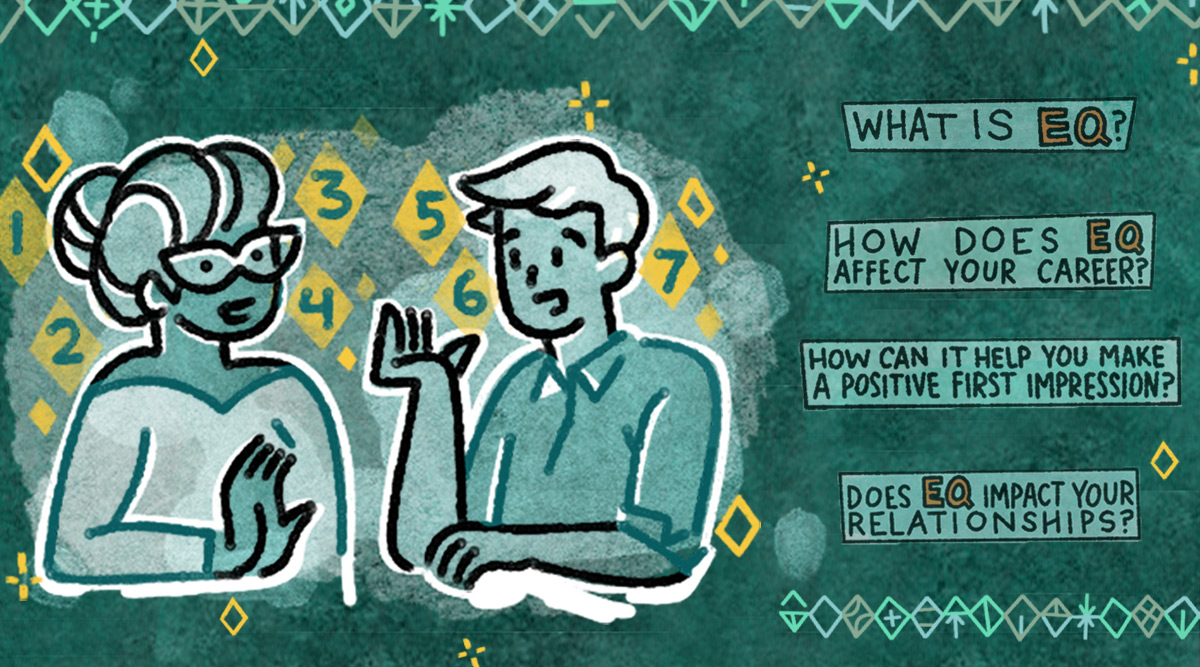Job Maestro: What is Your EQ?
Emotional Intelligence and Your Career

Illustrations: Michelle Lagasca
From job interviews to difficult conversations with your boss, the way you carry yourself in the workplace could make or break your career. To learn about emotional intelligence, the Job Maestro spoke with SJSU’s new Lucas College and Graduate School of Business Dean Dan Moshavi. He is an expert in leadership, high-performance teams, change management, and attitudes and emotions in the workplace. What’s cool about EQ, he says, is that it’s a set of competencies that anyone can develop.
What is EQ?
Emotional Quotient (EQ) or emotional intelligence is the ability to perceive, understand and regulate emotions—your own and others. A big part of it is self-awareness: Do you see yourself as others see you?
How can it help you make a positive first impression?
Part of being emotionally intelligent is spending time thinking about that impression before you make it, especially in a job interview context where a first impression takes about seven seconds. How are you dressed? Are you making eye contact? How is your handshake? Are you projecting confidence? Think deeply about those seven seconds.
Does EQ impact your relationships?
Absolutely. Your ability to manage relationships is another key component of EQ. In your place of work, you are developing a reputation score whether you know it or not. Emotionally intelligent people realize this and regularly reflect on how they have handled interactions with colleagues, customers and clients. They recognize that relationships shouldn’t be transactional and shouldn’t depend on someone’s position in the organization. Reputation is affected as much by how you treat the receptionist as how you treat your boss.
How does EQ affect your career?
When first entering the workforce, people are often hired for their technical competence, whether it’s accounting, marketing or engineering. Research shows, however, that one of the biggest reasons that people fail to advance as leaders and, in fact, sometimes have their careers come to a standstill, is the inability to develop or improve their EQ.
Three great ways you can improve your EQ:
- Seek feedback: One way to find out how others perceive you is to solicit and be open to feedback from colleagues and friends. But, steel yourself for the responses! Hearing candid feedback can be difficult.
- Work in teams: Take classes and join organizations where teamwork is emphasized. The adaptability, conflict management and influence capabilities needed for successful teamwork are all tied to emotional intelligence.
- Approach meetings as learning laboratories: We all have a range of emotions and some of these are difficult for ourselves and others to experience, but you can develop the competency to read emotions in others and respond in effective ways. A great place to observe this in action is during meetings. Watch the room and how people are reacting to the speaker, especially in their non-verbal language. Are they signaling respect, disinterest or perhaps hostility? Does the speaker pick up on the emotions in the room? Does he or she react or adapt in appropriate ways?
A portion of a $2.5 million gift from Gloria Chiang, ’78 Business Administration, ’79 MBA, and her husband Michael will help advance Moshavi’s vision to provide soft skills training, including how to improve EQ, to students in the Lucas College and Graduate School of Business.
![]()
Anger in the Workplace
Check out Moshavi’s TEDx talk, “Upsides of Anger”:




